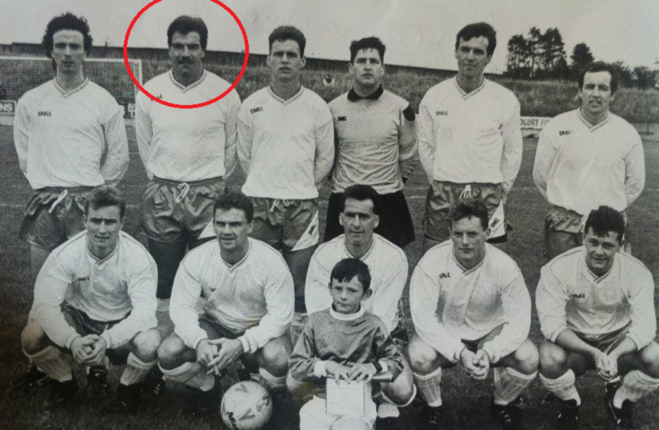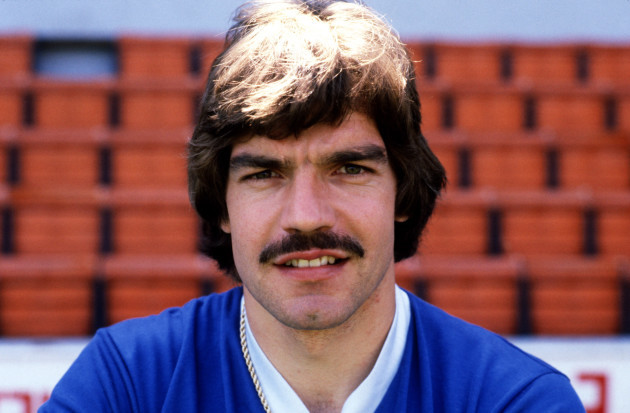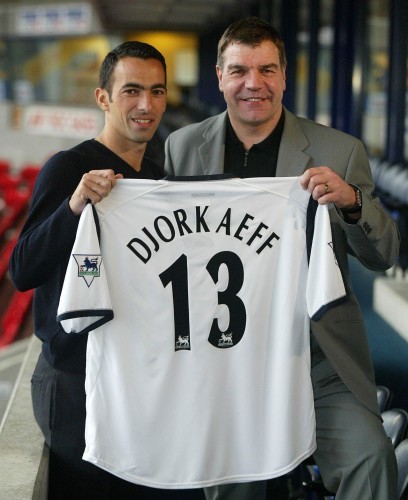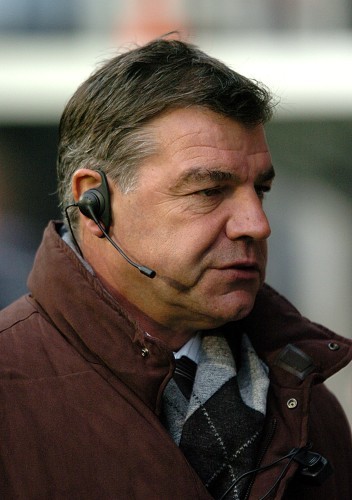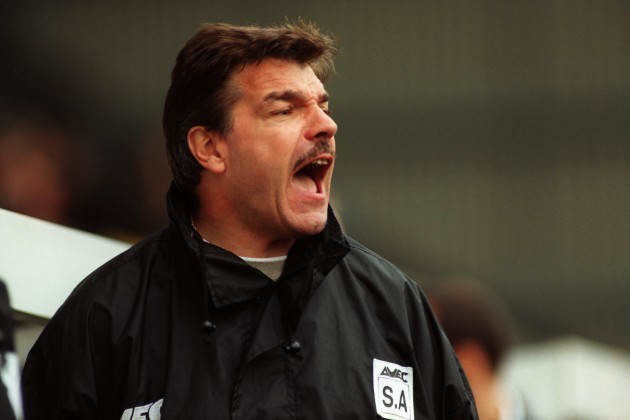IN THE SUMMER of 1991, Barry Ryan was about to turn his back on Limerick City FC.
His local club were dealing with the consequences of their first ever relegation from the League of Ireland Premier Division. They were without a manager and treading water.
Ryan was a young, bright attacker and in demand. He had just been crowned the PFAI Young Player of the Year and was about to move to Cork City.
But a single conversation changed his mind.
Turning out for a Munster XI in a pre-season friendly against Manchester City, he was introduced to Limerick’s new boss afterwards.
He didn’t really know much about the guy standing in front of him but he bought what he was selling.
“It was his no-nonsense, common-sense approach to the game, really”, Ryan remembers.
“He was old-school and called a spade a spade. He had a good work ethic, wanted you to play with pride in the jersey and wanted to develop a good team spirit. Those were the basic things he started off with. He asked me to give it a year and he was the main reason I stayed with Limerick.”
And that was the first encounter Barry Ryan ever had with Sam Allardyce.
It was Fr Joe Young, the then-chairman of Limerick, who brought the imposing defender to Shannonside as player-coach.
Allardyce responded proactively to the proposal. He enjoyed the fact that a team wanted him.
After being released by Millwall in 1983, he contacted every club in the top two divisions to let them know he was available but ultimately he was forced to head to North America and NASL side Tampa Bay Rowdies to bide his time owing to the lack of English interest.
A born coach – Millwall had toyed with the idea of appointing him manager when he was just 27 – he subsequently struggled to land a job as his playing days came to an end.
There was a short-term stint with the West Brom reserves. There was a a voluntary spell at Bury. There was a youth role at Preston before Allardyce was installed as caretaker manager. But damningly, he was never considered for the full-time job.
Decades later, Allardyce said he ‘had to leave the country’ and it wasn’t an exaggeration. Finding work was quickly becoming a problem.
In Limerick, he revelled in being afforded an opportunity.
And, finally, he got to be in charge.
“I’m surprised we could even afford him”, Ryan says.
“I don’t know how much he was on but I remember him going around Southill with Fr Joe and looking for sponsorship by just going to people’s houses and knocking on the door. We just didn’t have the money. Sam was the figurehead, the person put forward to do it. He was ‘Big Sam’ from day one. I’d say the money was the reason why he didn’t stay a second year. The funds just completely ran out.”
But it was never much of a culture shock to him. Despite the fact that the club’s ground at Rathbane was in dire need of investment, despite the fact there were no floodlights and despite the fact that Allardyce had to carpool to away games, Ryan stresses there were no ‘airs or graces’.
In fact, what made the player-coach stand out, was his attention to developing a togetherness and spirit.
“We had a lot of outsiders playing for us – from Dublin and Waterford”, Ryan says.
“And Sam would make those players come down and train on a Saturday morning but have a drink or some food in the pub afterwards with the fans and whoever was sponsoring the match that week. And that was unheard of. Players would normally just head straight home and come back for a match on Sunday. So that was his biggest attribute – team moral.
He used to bring his wife over – he wasn’t here for a jolly. He did everything right. He had charts up in the dressing-room when no one else did. He was a strict disciplinarian but loved a few pints with the lads after a match. That was his highlight of the week. He’d stay out all night with us – if we were heading out. After a game on a Sunday you’d stay out with all the local lads. And Sam was always there with us. But you always knew there was a line. He was the boss. And you have to have that as well – otherwise he’d never have got to where he has done.”
Allardyce eventually thought against buying a house in Limerick and settled on lodging with the team’s assistant manager Billy Kinnane instead. The routine saw him arrive on a Wednesday night or Thursday morning before a return flight to Manchester on a Monday.
He’d take a training session on a Thursday night and another on Saturday morning and the players reacted superbly to his style and system.
Sitting outside the top-flight for the first time in their history, it would’ve been understandable for a funk to descend on Ryan and his team-mates.
But Allardyce brought a freshness. It all just felt a little different.
“He had this work ethic, he had the honesty and he brought a breath of fresh air to Limerick - we weren’t used to that standard of dedication”, Ryan admits.
“He made us ruthless. He played with us and led from the back. With most leaders, they lead through their way of playing. When the weather improved, I remember him asking a few lads why they were wearing moulded studs. ‘You can’t kick anyone with moulded studs’, he said. That’s a small thing but it’s the way he wanted his defenders to play. But once you got to a certain part of the pitch, you were allowed express yourself and take risks. You play the hand you’re dealt as well and we were a First Division team and he didn’t know anything about us. So, he played safety first.
“He’s always labelled a long-ball merchant but it was never just a hopeless long ball. It was the first time I was actually told to pretend to switch off from the game when we were defending. And the minute we got the ball, it was hit into a space and I was supposed to be on my guard to run onto it. Now they call it ‘transitioning’ from defence to attack – all the big names with their coaching badges are using those terms – but he was actually doing that as part of the general common-sense he had about the game.
“He was more analytical. He’d pose a question to you. ‘Why would you do this in this particular situation? Why wouldn’t you do it this way?’ Before, managers would just say you’d had a great game or a bad game or you could’ve done better or tried harder. But he had a methodical approach to the game.”
Limerick only lost three times all season and Ryan finished the campaign as the joint-top scorer in the division. It was a harmonious relationship despite the complexities of Allardyce being both a team-mate and coach.
It said a lot for the esteem in which the Limerick players held their commanding centre-half.
“As a player, he would die on the field for you but he’d expect you to do the same for him”, Ryan outlines.
If there was someone who wasn’t doing it, you would get the hairdryer treatment at half-time – we’ll put it that way. He was such a big man that people would never take him on in the dressing room. But you didn’t have to either. On the pitch, you treated him as a player but still respected him as a manager. You didn’t tell him to eff off but if he did something wrong, you were willing to have your say with him on the field. But you always knew he was the boss.
“It’s only years later, when you become a coach yourself, that you realise how hard it is and how hard it must’ve been for him. The one thing he taught me was that if you expect someone to go through a wall for you, you have to be willing to do the same for him.”
Allardyce only lasted for a season but he returned Limerick to the Premier Division as champions. He moved back to the UK, initially at Preston and Blackpool before getting the Notts County job in 1997.
Two years later, he was unveiled at Bolton and the rest is history.
What subsequently happened at Limerick has also been well-documented elsewhere and though his time there was fleeting, Allardyce brought some positivity and some happiness to an oft-fractured and complex football landscape.
In the immediate aftermath of his departure, the Limerick players held out hope that he’d return in the short-term.
“We were hoping that he’d come back to us”, Ryan says.
“We’d won the First Division, everyone knew exactly how to play, we were familiar with the structure of everything and he was someone you wanted to play for.
“He guided us through a bad patch because it had been the first time ever that we’d been relegated and he got us back up in nine or 10 months. He was the reason I stayed put but two years after he was gone, I left as well. Limerick wasn’t a good place, financially, at the time and we were always wondering if we were going to last the year.
“It was a big loss when he left.”
The42 is on Snapchat! Tap the button below on your phone to add!
